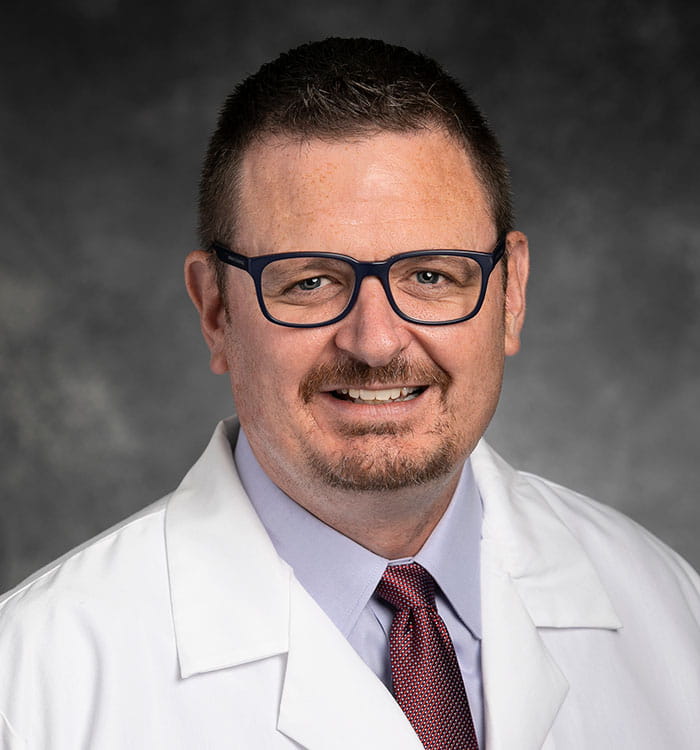UH Rainbow Clinical Leader Receives New NIH Grant to Spur Better Outcomes for Children with Sepsis
August 20, 2025
Innovations in Pediatrics | Summer 2025
 Kenneth Remy, MD, MHSc, MSCI, FCCM
Kenneth Remy, MD, MHSc, MSCI, FCCMKenneth Remy, MD, MHSc, MSCI, FCCM, Director of Critical Care Research and Ellery Sedgwick, Jr. Chair and Distinguished Scientist in Cardiovascular Research at University Hospitals and renowned pediatric intensivist, has secured a new R01 grant from the National Institutes of Health aimed at mitigating a devastating consequence of sepsis --- sepsis-induced multiple organ dysfunction (siMODS). This condition affects approximately 60% of critically ill children with sepsis and has a very high mortality rate.
“These patients may develop persistent impaired host protective immunity leading to potentially chronic critical illness,” Dr. Remy says. “This is marked by a failure to completely eradicate the initial invading pathogens, recurrent secondary nosocomial infections, increased hospital length of stay and late mortality. Key gaps in knowledge exist in understanding why some children develop these persistent defects in host protective immunity.”
In the study based at UH Rainbow Babies & Children’s Hospital and Case Western Reserve University School of Medicine, Dr. Remy will lead colleagues from children’s hospitals affiliated with the University of Minnesota, University of Iowa and University of Washington. The prospective, observational trial will compare 382 siMODS and critically ill non-septic MODS patients and will test promising new approaches to care that have arisen over years of research in Dr. Remy’s lab.
“The overall theme of my laboratory and my clinical work is understanding the immune system in adults and children and understanding how in times of stress and critical illness patients have better or worse outcomes,” he says. “We try to figure out what’s wrong in the immune system, first and foremost, and then understand exactly what happens over time, and then develop therapies that are targeted to those mechanistic pathways. It’s personalized medicine 5.0. What we’re doing is endotyping to understand the immune signatures of children with sepsis so we can understand better ways to mitigate their poor outcomes.”
Specifically, Dr. Remy and colleagues will seek to validate an ELISpot assay as an optimal biomarker to accurately diagnose alterations in a patient’s immune system, while exploring the underlying genetic molecular pathways driving a patient’s severity of illness. They will also test ex vivo potential immune therapies for subsequent clinical development.
The scientific premise behind this work, Dr. Remy says, is that immune profiling of pediatric siMODS patients will identify functional immune endotypes that reflect protective immune status and uncover the mechanistic pathways to help design targeted therapies to restore protective immune status. At the same time, the team will be able to identify heterogeneity in response to immune therapies among affected endotypes, allowing endotypes with highest risk of poor clinical outcomes to be separated for personalized therapy.
However, this approach from Dr. Remy is not just unique to siMODS.
“We do something similar with bronchiolitis,” Dr. Remy says. “We try to understand the immune defects that lead to kids having worse outcomes with bronchiolitis. We’re trying to understand why people have the disease and have increased severity.”
In fact, Dr. Remy and Steven Shein, MD, Division Chief of Pediatric Critical Care Medicine at UH Rainbow, began a consortium three years ago with Akron Children’s Hospital, Cleveland Clinic and MetroHealth, with the goal of translating research findings from Dr. Remy’s lab into next-level evaluations for kids with critical illness. The team is unique in the United States to be funded by the Society of Critical Care Medicine to do this work.
“We've leveraged our consortium with our high-level immune phenotyping platform to be able to do this, and so we are currently amidst that trial right now in children,” Dr. Remy says.
Beyond the gratifying work of studying pressing clinical problems, Dr. Remy says he also gets great satisfaction from what his research grants enable to do – serve as a mentor to young physician-scientists. In fact, he recently also secured an R35 (R01 equivalanet0 grant from the NIH to support his work in understanding the interactions of hemolysis and immune system in pediatric and adult sepsis and sickle cell disease. .
“Grants provide opportunities for ancillary studies for junior faculty, which is near and dear to me as a pediatric intensivist,” he says. “It’s very rewarding to be able to mentor the next generation of physician-scientists. That’s the lifeblood of our institution, to have junior scientists who are going to continue this work moving forward.”
Contributing Expert:
Kenneth E. Remy, MD, MHSc, MSCI, FCCM
Director, Critical Care Research and Ellery Sedgwick, Jr. Chair and Distinguished Scientist in Cardiovascular Research
University Hospitals
Director, Blood, Heart, Lung, and Immunology Research Center
Case Western Reserve University School of Medicine


